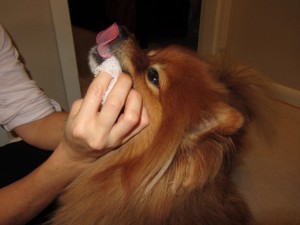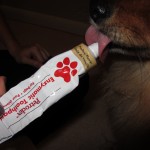 Does your Pom have bad breath? You are not alone! As a Pommy Mommy of two Poms that used to have bad breath – one of which recently had to have a tooth extraction – I can speak from experience in this department. Another question: do you brush your Pomeranians teeth?
Does your Pom have bad breath? You are not alone! As a Pommy Mommy of two Poms that used to have bad breath – one of which recently had to have a tooth extraction – I can speak from experience in this department. Another question: do you brush your Pomeranians teeth?
Bad breath is often an indicator of poor dental hygiene (I wish I would have known this sooner!). Like many other toy breeds, Poms are prone to dental problems and early tooth loss. The good news? Much of this can be prevented by providing your Pom with the proper care.
Why Dental Care is Critical for Pomeranians
Daily dental care is essential to prevent bad breath and severe dental problems. Many Pom owners don’t realize that bad breath isn’t just unpleasant—it’s often the first warning sign of underlying dental issues. Poms are at risk for infections, tooth loss, and gum disease without proper care.
How to Get Started with Brushing Your Pom’s Teeth
One of the best ways to combat bad breath and maintain your Pomeranian’s oral health is to brush your Pomeranians teeth every day.
You might think, “There’s no way my Pom will let me do that!” Trust me, I was in the same boat. I avoided brushing my Poms’ teeth for a long time, and unfortunately, that led to my little Foxy developing an infection. She eventually had to have a tooth pulled, and I felt awful.
The trick is to make brushing part of your Pom’s daily routine, so they become accustomed to it. If you start when they’re puppies, it’s even better—but it’s never too late to begin.
Steps to Introduce Toothbrushing to Your Pom
- Start Slow
Before you brush your Pomeranians teeth, gently run your finger along their teeth. This will help them get used to the sensation. - Use a Finger Toothbrush
Once they’re comfortable with your finger in their mouth, try using a finger toothbrush to brush your Pomeranians teeth. This small, soft tool slips over your finger and has brush-like bristles. - Transition to a Dog Toothbrush
After they’re used to the finger toothbrush, switch to a dog-specific toothbrush with dog-friendly toothpaste. Never use human toothpaste, as it contains toxic ingredients for dogs.
Alternative Techniques if Toothbrushing Isn’t Working
 Some Poms might resist traditional brushing, and that’s okay. If your Pom’s mouth is too small or won’t warm up to the toothbrush, there are other ways to keep their teeth clean.
Some Poms might resist traditional brushing, and that’s okay. If your Pom’s mouth is too small or won’t warm up to the toothbrush, there are other ways to keep their teeth clean.
- Gauze-Wrapped Finger: Wrap gauze around your finger, apply a bit of canine toothpaste, and gently rub it along their teeth.
- Use a Washcloth: A small, damp washcloth can do the trick.
This gauze technique was a game-changer for my Poms, Foxy, and Bear-Bear, especially when they were hesitant about the toothbrush.
Find the Right Canine Toothpaste
 One thing that made a huge difference for us was discovering that my Poms loved chicken-flavored canine toothpaste! They enjoy it so much that they see brushing as a treat. Toothbrushing has become an enjoyable part of our routine instead of a struggle.
One thing that made a huge difference for us was discovering that my Poms loved chicken-flavored canine toothpaste! They enjoy it so much that they see brushing as a treat. Toothbrushing has become an enjoyable part of our routine instead of a struggle.
Pet stores carry a variety of dog-friendly toothpaste flavors. For a natural option, you can mix baking soda with water.
Praise your Pom throughout the process to reinforce positive associations with toothbrushing.
Explore Dental Sprays, Gels, and Wipes
If brushing isn’t an option for your Pom, there are alternatives. Dental sprays, gels, and wipes help to reduce plaque and freshen breath without brushing.
These products are easy to apply and can be especially helpful if your Pom is skittish about having their mouth handled.
The Importance of Professional Vet Cleanings
In addition to daily care at home, taking your Pom to the vet for a professional cleaning at least once a year is crucial. While daily brushing helps manage plaque, professional cleanings remove hardened tartar that can’t be addressed at home.
A professional dental visit also allows the Vet to examine your Pom’s mouth for any early signs of dental disease or other issues. Catching problems early can prevent more severe complications down the road.
Choose the Right Diet to Support Dental Health
Feeding your Pom the right food can also significantly improve its oral health. Dry dog food is generally better than wet food for reducing plaque build-up. You can also introduce dental bones and chew toys that promote healthy teeth and gums.
These products help scrape away plaque and give your Pom a chance to exercise their jaws, which can contribute to better dental health over time.
When to See a Vet for Persistent Bad Breath
If you’ve been diligent with brushing, tried gels and sprays, and switched to a dental-friendly diet, but your Pom’s bad breath persists, it may indicate a more severe problem. Bad breath can sometimes be a sign of:
- Gum disease
- Tooth infections
- Digestive issues
- Kidney or liver problems
If your Pom’s breath smells unusually bad despite all your efforts, it’s time to visit the vet to rule out underlying health conditions.
Happy Brushing, Healthy Poms!
With patience, the right tools, and creativity, you can conquer your Pom’s bad breath and keep their teeth healthy. Regular brushing, professional vet cleanings, and a dental-friendly diet will set your Pom up for success.
And remember, no matter how challenging it seems at first, the time you invest in your Pom’s oral care will prevent future health problems—and make those Pommy kisses all the sweeter!
Peace, Love & Pomeranians,
Pom Mom Jaime Mowers

Jaime Mowers is the proud Pommy Mommy of Foxy and Bear-Bear.
Related Posts:
Does Your Pomeranians Breath Smell?
Why Pomeranian Dental Care Is Vital for Your Fur Baby
